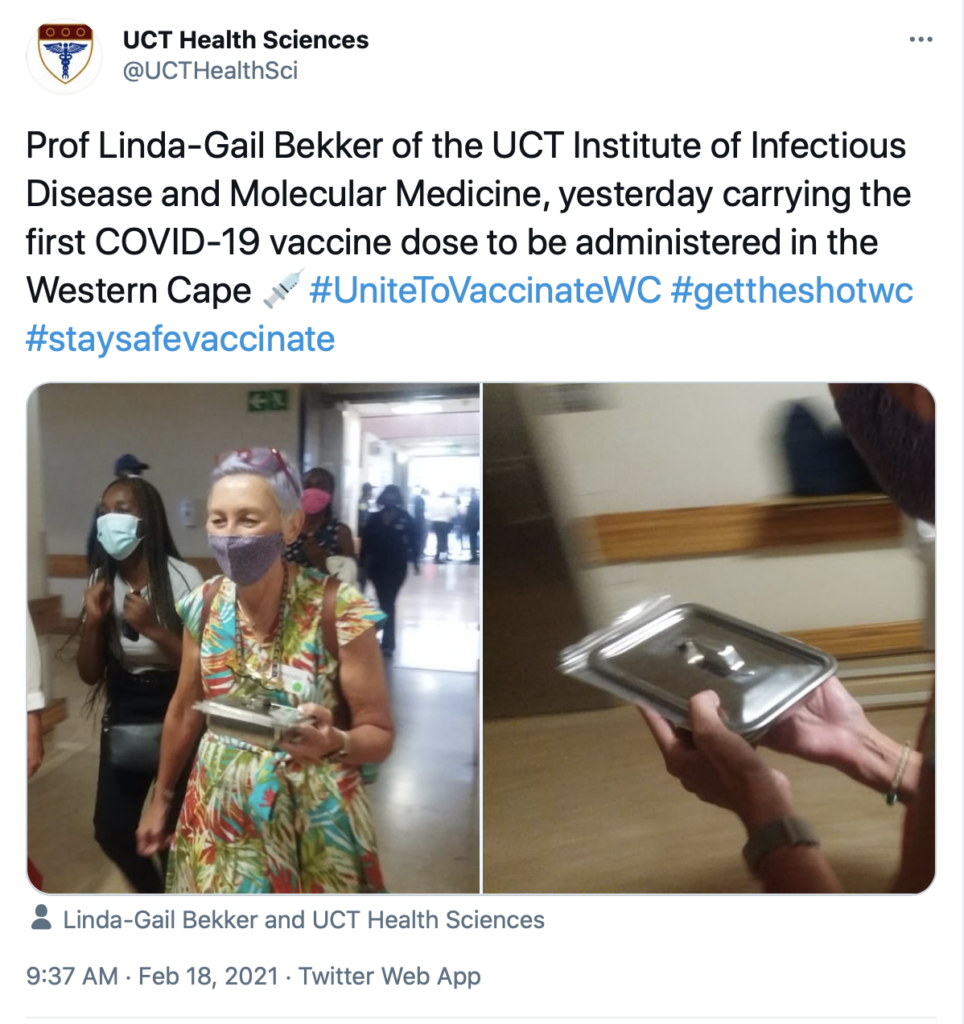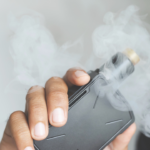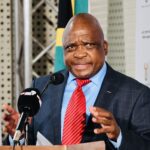- Linda-Gail Bekker is the co-lead investigator of the Sisonke trial that provides health workers in South Africa with early access to COVID vaccines.
- Bekker published 69 peer-reviewed journal papers in 2020 and has been working day and night to get vaccines into the country, along with the South African Medical Research Council’s Glenda Gray.
- The fight against vaccine nationalism reminds Bekker of her and other scientists’ struggle for access to antiretroviral treatment for people with HIV.
Linda-Gail Bekker runs a hand impatiently through her lilac and silver pixie-cut hair and stands up to open the windows in a tiny corner office at the Groote Schuur Hospital campus of the University of Cape Town (UCT).
She marches to a large, wooden-framed window and fiddles with the latches. “Everything we know about the benefits of ventilation to limit transmission of COVID-19 could easily have been applied to help prevent the spread of TB a long time ago,” she says. “COVID has forced us to rethink everything, including how we design buildings.”
Bekker’s ground-floor office overlooks the Chris Barnard heart centre and the hospital’s old mortuary.
“It’s not the greatest part of the medical campus,” she explains. “But in the early days, when people were coming to our centre for antiretroviral treatment [ARV] trials, we wanted to give study participants an easy way into the building without having to disclose their status, so they could just slip in though a side door.”
Bekker pushes the old, heavy window open as far as she can, expels a heavy sigh and grins: “I’m a bit of a dramatist as you can tell. I love being on stage.”
The Zimbabwean-born doctor is the director of UCT’s Desmond Tutu HIV Centre and an internationally acclaimed HIV and TB researcher. But right now, she’s in the spotlight — along with the South African Medical Research Council’s Glenda Gray — for being the co-lead investigator of South Africa’s Sisonke COVID vaccine trial. The study, which looks at how the Johnson & Johnson shot performs when rolled out on a large scale, is the only way that South Africa’s health workers are currently able to access COVID jabs while the country’s medicine regulator concludes its approval processes for several COVID vaccines, including Johnson & Johnson’s.
When the first health worker received their COVID jab just after 2pm on 17 February, it was Bekker who carried that Johnson & Johnson dose — a vial in a neat aluminium holder — down the main corridor of Khayelitsha District Hospital in the Western Cape to the vaccination room.
And when President Cyril Ramaphosa was vaccinated in the same room shortly thereafter, Bekker, along with Gray, watched quietly over his shoulder until the procedure was concluded.
The events were broadcast live on television and Bekker enjoyed every bit of it — not just because she loves action, but also because she, her husband and son had all developed COVID in December. “It was scary as hell because of its unpredictability,” she recalls. “At night I would lie next to my husband as he coughed, worrying he would crash, and wake him up to take his temperature. We, as doctors, knew the symptoms and course of the disease to the T, and still there was a huge, intimidating fear element to it.”
“They decided I was a drama queen and gave me a golden crown, wand and tinsel”
Gold tinsel is draped across a bookshelf sagging under the weight of medical science books and research awards in Bekker’s office. On her desk, a stethoscope lies coiled next to a sheaf of paper, a gold plastic crown, magic wand and two smiling plastic penises in different shades of brown.
“I got the penises from a sexual health clinic for gay men in London that I visited for work,” she explains. “I’m far more on the side of positive affirming health education rather than ‘don’t do’ restrictive stuff.”
The crown-tinsel-wand combo dates from Bekker’s days as the first African president of the International Aids Society (an association that is responsible for organising the world’s most influential international Aids conferences) between 2016 and 2018. “I’m not shy, I’m forward — and a little controlling,” Bekker admits. “So they decided I was the drama queen and gave me all the stuff that fitted with it as an inauguration present.”
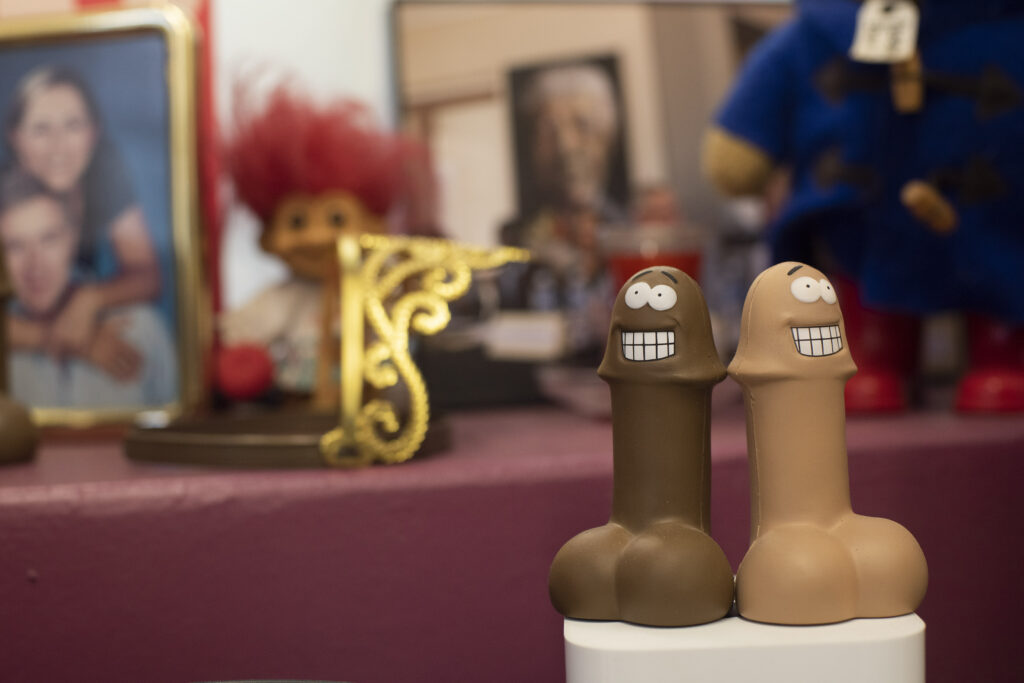
In 2020, Bekker co-published a whopping 69 peer-reviewed research papers, mostly on the use of oral pre-exposure prophylaxis (PrEP), in the form of a daily HIV prevention pill, for teenagers and young women. Part of this research has resulted in practical programmes, such as the Desmond Tutu Health Foundation’s PrEP project, which has Tutu Teen Trucks distributing HIV prevention pills to women between 16 and 25 (the group most vulnerable to HIV infection in South Africa) in areas such as Khayelitsha, Nyanga and Philippi in Cape Town.
Bekker established the foundation in 2004 with her husband, the world-renowned TB researcher, Robin Woods.
“At the heart of it, I’m a researcher, that’s my essence,” she explains. “I’m fascinated by why things are the way they are, what makes them go the way they do, and how they could work better — and what I’ve chosen is the health system and infectious diseases as my black box to unpack.”
Last year, this black box expanded from HIV and TB research to the largest pandemic the world has seen in recent years. Bekker became the co-principal investigator of the South African arm of Johnson & Johnson’s Ensemble study, which showed that, 28 days after it is administered, the company’s COVID-19 vaccine is 64% efficacious in protecting against moderate to severe COVID in South Africa, 85% against severe disease and 100% against hospitalisation and death.
It was these results, released in late January, that led to South Africa’s current Sisonke implementation trial, which is providing health workers in the country with early access to Johnson & Johnson’s jab by using 500 000 doses of free research stock provided by the multinational. The government had originally planned to use the drug company AstraZeneca’s COVID jab, but that fell through when the results of a small study showed that the shot provided only 10% protection against mild to moderate COVID caused by 501Y.V2, a new variant of the SARS-CoV-2 virus, that causes COVID-19.
The Ensemble study, however, was conducted at the same time this more infectious variant emerged in South Africa. With 501Y.V2 responsible for more than 90% of the COVID cases recorded during the study, the research was able to establish how well the Johnson & Johnson jab works in protecting against the variant.
Although the government has procured 11 million Johnson & Johnson jabs, the shots (or at least some of them, depending on stock availability) can only be shipped once the vaccine has been approved for use by the South African Health Products Regulatory Authority — a lengthy process that’s likely to only be concluded in April.
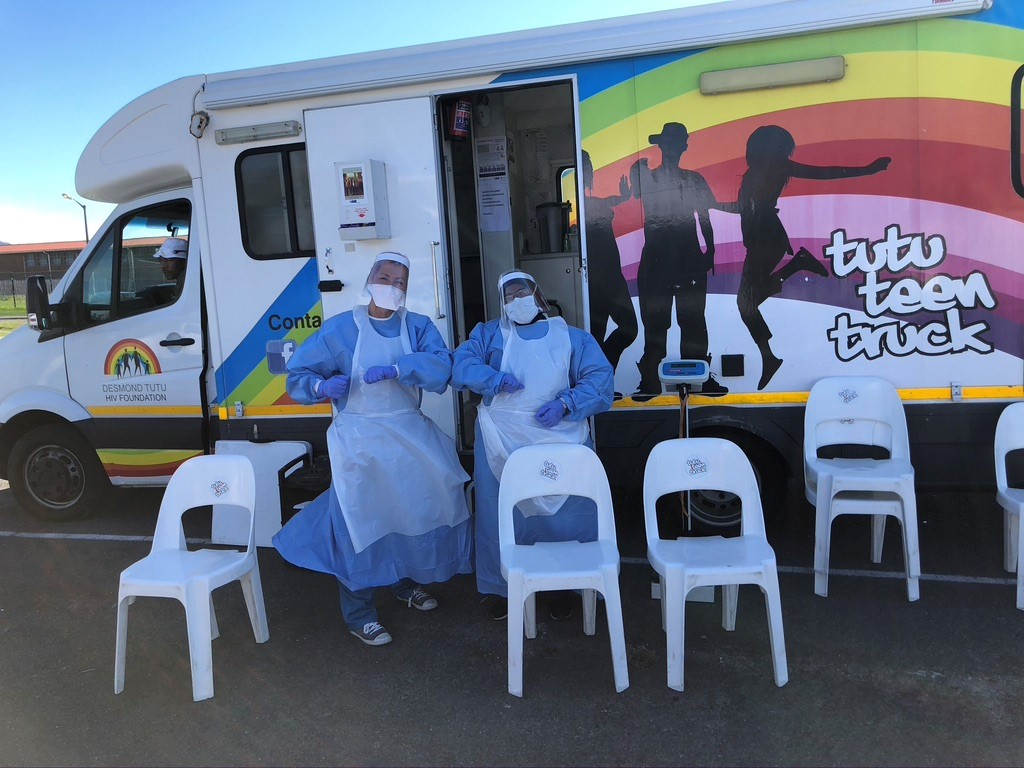
In an effort to get jabs into the country in the meantime, Bekker and Gray designed the Sisonke study, as Sahpra approval for the use of a vaccine in a research setting requires far fewer checks and is therefore much faster.
By Monday evening, about 148 000 of the country’s estimated 1.25 million health workers (this includes everyone working in health settings, not just medical professionals) had been vaccinated; the Sisonke study’s investigators aim to have 500 000 workers vaccinated by the end of April.
“COVID research is HIV research on steroids, it happens at double the pace and you’ve got all the additional air transmission risks, which means most of the research is conducted remotely and contact with study participants is via apps or the telephone,” Bekker says. “Because we’re also targeting older people, who are more likely to fall seriously ill from COVID, doing research remotely has been challenging [because older members of society are less likely to use apps or have tablets or smartphones].”
Bekker and the Sisonke team have been working day and night to get vaccines into the country, ensure they’re distributed equitably, procure syringes and train sufficient vaccinators.
“The pace and the pressure, given that all of this is moving incredibly fast, put a huge amount of pressure on our side,” she explains. “But we’re driven by the fact that each health worker who gets vaccinated via Sisonke is someone who wasn’t protected before.”
HIV and TB brought Bekker and her husband together — that and a bit of ballroom dancing
Even as a three-year-old on the Zimbabwean farm where she grew up, Bekker dreamed of being a medical doctor. “It was like, hello, sorry, that’s me — I’m going to direct everything towards becoming a doctor, from the games I play, to the school subjects I choose in high school to the type of topics I focus on during debating competitions.”
By graduating with an MBChB from UCT in 1986, the former high school head girl had realised that dream. “Not because I’m particularly bright, I’m just very industrious — when I’ve set my mind on something, I do it with full vigour and enthusiasm,” she says.
Bekker then specialised to become an infectious diseases specialist and also completed a PhD in which she compared how HIV-negative and positive people responded to tuberculosis infection.
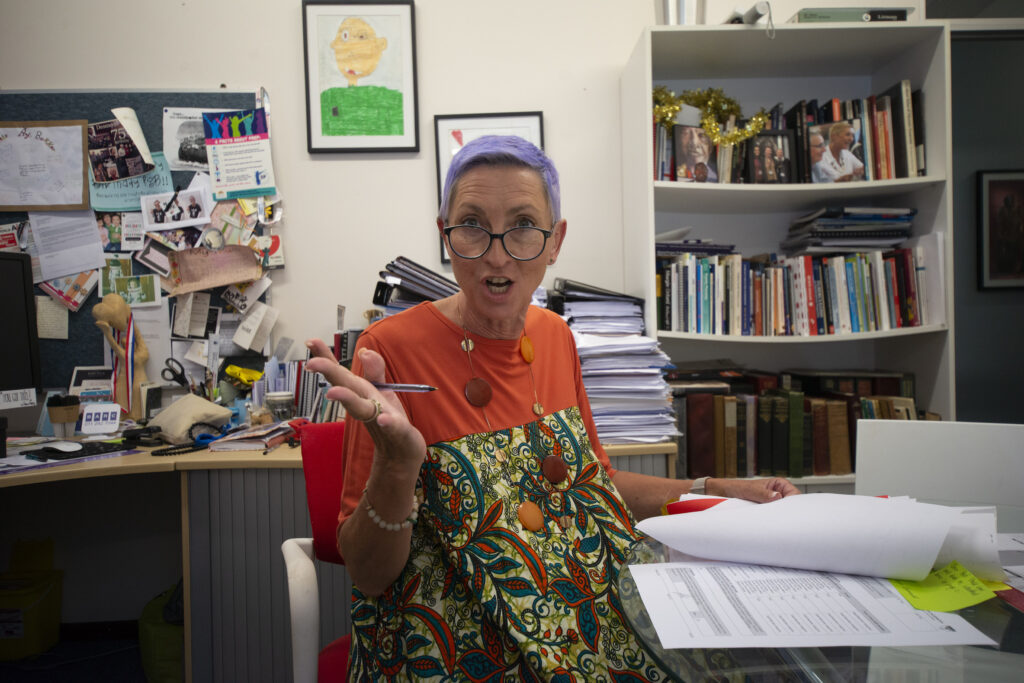
It was HIV and TB — as well as the physician’s love of drama and being “voor op die wa” [being forward] — which brought Bekker and her husband together. While she was working as a registrar at Groote Schuur Hospital — part of her infectious diseases specialisation — she moonlighted at the nearby Somerset Hospital, where Woods ran was running an HIV clinic.
The couple got acquainted and once went to see a South Asian art film in which there was ballroom dancing. “Voor op die wa as I am, I looked in the newspaper and saw lessons advertised for Latin American dancing, and called Robin to say I had booked us,” Bekker laughs.
She pauses and glances at one of the pictures of their son, Ollie, on her desk. “You can’t do ballroom dancing and not create chemistry, the tango is seductive,” Bekker smiles.
Twenty one years later, and with Ollie now 19 years old, both Bekker and Woods are “still very much related through HIV and TB”.
Bekker points to the pictures on her office wall that a young Ollie drew of his parents to congratulate them on becoming professors and says: “Ollie had an unusual childhood. He grew up in a household with constant chatter about CD-4 counts [a measurement of the strength of someone’s immune system] and viral loads [a measurement of how much virus of, for instance, HIV, there is in someone’s body]. But he turned out relatively normal.”
Being a scientist isn’t enough — you have to be an activist too
There are six piles of papers and lever arch files stacked, in no particular order, on the right of Bekker’s desk — next to a potted miniature rose plant, its cardboard wrapping still untouched.
“I have no focus,” she laughs. “I’m all over the place, I’m interested in many things, in all aspects of the work I do.”
With a tilt of her head, Bekker says she tells her students that the study of infectious diseases is like a colossal round of the murder mystery game Cluedo.
“Somebody in a room has been taken out by some weapon and you’ve got to figure out what it is — so there’s the pathogen, there’s health, there’s an organ system, you’ve got to find it and deal with it.”
But the research that underpins the solutions, Bekker believes, should not only be understood by medical professionals.
“I do think science is precious, but it’s not only for the [people holding] PhDs — a small fraction of humanity. It’s something we can make accessible to other people.”
That’s why she has a Twitter account — with more than 5000 followers. “I pride myself that I am one of those lucky people who can take quite a tough concept and translate it,” she explains. “Robin gets furious because he’s smarter on a whole different plane to me. He’s incisive in his thinking, but I often can take his lecture and make it more accessible and people go, ‘Wow, I really enjoyed that’. Then I go, ‘Well, that was actually exactly what he said’.”
[WATCH] Linda-Gail Bekker for the Desmond Tutu Foundation Women of Worth
On Twitter, however, Bekker doesn’t just stick to the hard science — she gives her opinion too, on subjects ranging from the US elections (she’s a Joe Biden supporter) to Chief Justice Mogoeng Mogoeng linking COVID vaccines to the devil and the number 666 (“people in high office and public positions have a responsibility to care about their words and/or not speak about topics they don’t have a clear understanding of”) to the pace of the government’s COVID vaccine roll-out (“looking forward to seeing dates associated with this communication. Time = infections = deaths”).
It’s not the first time Bekker has voiced her concerns about policy implementation publicly. During the HIV denialism of the Thabo Mbeki administration in the late 1990s and early 2000s she and Woods both sided with the advocacy organisation, the Treatment Action Campaign, in their fight for access to ARV treatment for people with HIV.
“It’s like this is déjà vu now with COVID vaccines,” she says.
“I’m at that place now where I’m reminded that access [to COVID jabs] is not a given, it seems scientists will always have to be activists around access putting pressure on governments and international bodies to make sure lifesaving interventions such as vaccines are provided timeously and equitably in a world that’s dominated by inequality.”

